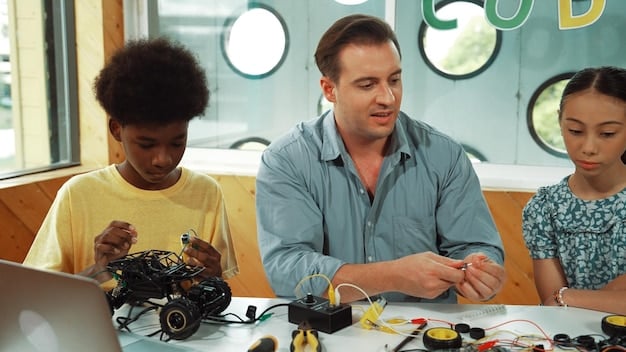Start a Community Mentoring Program: Empowering Youth & Building Bonds

Starting a community mentoring program creates lasting positive impacts by offering guidance, support, and skill development to young individuals, fostering strong relationships between mentors and mentees, and empowering youth to reach their full potential.
Are you passionate about making a difference in your community? Starting a community mentoring program can be a powerful way to impact young lives, fostering positive relationships and providing guidance that shapes future success. Let’s explore how to establish a mentoring program that benefits both youth and the community as a whole.
Why Start a Community Mentoring Program?
Launching a community mentoring program is more than just a feel-good initiative. It’s an investment in the future, building a stronger, more resilient community by empowering its youngest members. But what exactly are the benefits of such programs?
Addressing Critical Needs
Many young people face challenges that can hinder their development and limit their opportunities. Mentoring programs provide crucial support in overcoming these obstacles. Whether it’s academic struggles, social isolation, or a lack of positive role models, mentors can provide guidance and encouragement.
By addressing these needs head-on, mentoring programs help young people build confidence, improve their academic performance, and develop essential life skills. This, in turn, reduces the likelihood of negative outcomes such as dropping out of school or involvement in risky behaviors.
- Increased academic achievement and engagement in school.
- Improved self-esteem and confidence.
- Development of stronger social skills and relationships.
- Reduced risk of engaging in negative behaviors.
Mentoring programs offer a lifeline to those who may otherwise struggle, providing a stable and supportive environment where young people can thrive.

Defining Your Program’s Focus and Goals
Before recruiting mentors or advertising to potential mentees, it’s essential to define the specific focus and goals of your mentoring program. This clarity will guide your recruitment efforts, program design, and evaluation process.
Identifying the Target Youth Population
Consider the particular needs and challenges within your community. Are you primarily trying to address academic achievement gaps, promote college readiness, or support youth facing socioeconomic disadvantages?
Identifying a specific population will allow you to tailor the program to their requirements.
By clearly defining the target population, you can ensure that your mentoring program is relevant and effective, providing the personalized support that young people need to succeed.
Setting Measurable Objectives
Setting clear, measurable objectives is crucial for evaluating the success of your mentoring program. Consider specific outcomes you want to achieve, such as improvements in school attendance or a reduction in risky behaviors. Objectives could include:
- Raise average GPA among mentees by a half letter grade.
- Increase school attendance rates for mentees by 10%.
- Promote community involvement throughout structured volunteering.
Setting measurable objectives allows you to track your progress, identify areas for improvement, and demonstrate the impact of your program to stakeholders.
Defining your program’s focus and goals is not just about improving statistics; it’s about creating meaningful change in the lives of young people. By setting clear objectives and tailoring your program to the needs of your community, you can ensure that your mentoring initiative has maximum impact.
Recruiting and Screening Mentors
The heart of any successful mentoring program lies in the quality of its mentors. Recruiting passionate, dedicated mentors and thoroughly screening them are critical steps.
Developing a Mentor Recruitment Strategy
Attract dedicated individuals by spreading awareness through community networks, schools, local businesses and non-profits. The strategy should emphasize the positive impact mentors can achieve, highlighting the opportunity to shape young lives. Highlight flexible time commitments and structured training programs.
A targeted recruitment strategy will help you attract a diverse pool of qualified candidates who are truly committed to mentoring.
Remember, successful mentor recruitment is about finding individuals who are not just willing to volunteer their time, but are genuinely passionate about making a difference in the lives of young people.
Implementing Thorough Screening Processes
To ensure the safety and well-being of the mentees, it’s essential to have a comprehensive screening process. Background checks are the foundation of this, verifying that mentors have no history of criminal activity or inappropriate behavior. A well-designed screening process will help you create a safe and supportive environment for all participants.
- Criminal Background Checks: Perform thorough background checks at the state and federal levels.
- Reference Checks: Check references and verify character.
- Conduct thorough interviews to assess motivation, experience, and suitability.
- Provide comprehensive training on mentoring best practices and program policies.
Recruiting and adeptly screening mentors creates a solid base. By attracting compassionate individuals and ensuring their qualifications, you can dramatically improve the success of your mentoring program and maximize the positive impact on young people’s lives.

Structuring the Mentoring Relationship
A structured mentoring relationship enhances the mentoring process, supporting the mentee to achieve particular goals with greater clarity. It guarantees consistency, direction, and measurable outcomes that are useful in the long run .
Establishing Clear Guidelines and Expectations
Ensure that mentors and mentees know what is expected of them by developing comprehensive guidelines for the mentorship. Outline the roles and responsibilities of each participant and the frequency and duration of interactions. By defining a common understanding, clarity and commitment will grow.
Establishing clear guidelines and expectations is fundamental to building trust and accountability in the mentoring relationship.
Facilitating Regular Check-ins and Support
The support and guidance provide by regular communication is crucial. Schedule check-ins with mentors to discuss progress, address challenges, and provide ongoing training and development. Regular support is often the difference between a relationship that thrives and one that flounders.
Facilitating regular check-ins and support not only strengthens the mentor-mentee relationship but also ensures the long-term success of the program.
- Implement regular mentor check-ins by email, phone or brief surveys.
- Encourage informal communication via text or email.
- Arrange group workshops for continued development of mentees.
Promoting Youth Development Skills
The key to a successful mentoring program extends beyond academic and personal support to developing essential life skills that will serve young people throughout their lives. Skill development encourages resilience, promotes productivity, and supports overall growth.
Implementing Skill-Building Workshops
Offer workshops and training sessions focused on developing specific skills, such as communication, problem-solving, and leadership. This can be done through group activities, interactive discussions, and hands-on projects and help to create an interactive environment.
Workshops provide a structured platform for developing these skills, enhancing their confidence and preparing them for the challenges they may encounter.
.
Implementing skill-building workshops expands the impact of your mentoring program, equipping young people with the tools they need to succeed in school, work, and life.
Encouraging Goal Setting and Achievement
Mentors should encourage mentees to set specific, achievable goals and provide support and guidance to achieve those objectives. Goal setting empowers the mentee.
- SMART Goals: encourage goal setting using specific, measurable, achievable, relative and time-bound standards.
- Tracking Progress: create ways to monitor the youths advancement.
Setting goals that are both challenging and attainable fosters confidence, develops resilience, keeps them motivated, and develops a belief in their capabilities.
Encouraging goal setting and achievement not only promotes skill development but also empowers young people to take control of their futures and achieve their full potential.
Measuring the Program’s Impact
Measuring the program’s impact is about understanding the positive impact you are having on the lives of young people and using that knowledge to improve your initiative. Using evidence-based practices, you can enhance the wellbeing of the people in your program.
Tracking Key Performance Indicators (KPIs)
These are quantifiable metrics that measure the effectiveness of your program. These should align with the goals and objectives of your mentoring program and provide valuable insights into success.
Tracking progress and KPIs helps focus on continuous enrichment, accountability, and effectiveness.
Collecting Feedback and Testimonials
Actively seeking feedback from mentors, mentees, and their families can provide valuable insights into the program’s strengths and weaknesses. This feedback can then inform program improvements, ensuring effectiveness and relevance.
Collecting feedback and testimonials adds a human dimension to your evaluation, enhancing the credibility and impact of your outcomes.
By measuring the program’s impact and tracking KPIs, you can demonstrate the positive outcomes your program is achieving and make data-driven decisions to enhance effectiveness. Measuring impact also creates a powerful testament to the transformative capacity of mentoring, inspiring others to invest in the future of youth and the community.
| Key Point | Brief Description |
|---|---|
| 🎯 Setting Goals | Establishing the target audience helps tailor the mentoring program. |
| 🤝 Mentor Recruitment | Recruiting dedicated mentors through community networks enhances program quality. |
| 🏆 Skill Development | Workshops focused on communication and leadership promote personal development. |
| 📊 Measuring Impact | Tracking KPIs and feedback helps evaluate and improve program effectiveness. |
Frequently Asked Questions
Community mentoring programs offer numerous benefits, including improved academic performance, enhanced self-esteem, positive relationships, and reduced risk-taking behavior among youth.
Recruit mentors by partnering with local schools, community organizations, and businesses. Highlight the chance to positively impact young lives, offering flexible volunteering, and adequate training.
Emphasize a variety of skills. Communication skills, problem-solving, and leadership are all crucial life skills. Goal-setting and time management are also important for personal and professional development.
Facilitate regular communication thorough scheduled check-ins, email, texting or brief weekly surveys. Open lines of communication, and positive relationships with trust and mutual respect can build.
Measure impact by tracking KPIs, like improvements in school attendance or grades, administering surveys, and gathering testimonials from youth, mentors, and involved families which can provide invaluable insights.
Conclusion
Starting a community mentoring program is a transformative endeavor that offers profound benefits for both youth and the community as a whole. By focusing on the pillars of comprehensive planning, dedicated mentor engagement, skill development, and continuous evaluation, you can establish a mentoring program that not only addresses current needs but also cultivates a brighter future for the next generation. Remember that the impact of these relationships often transcends mere statistics, creating lasting positive change in individual lives and strengthening the social fabric of our communities.





